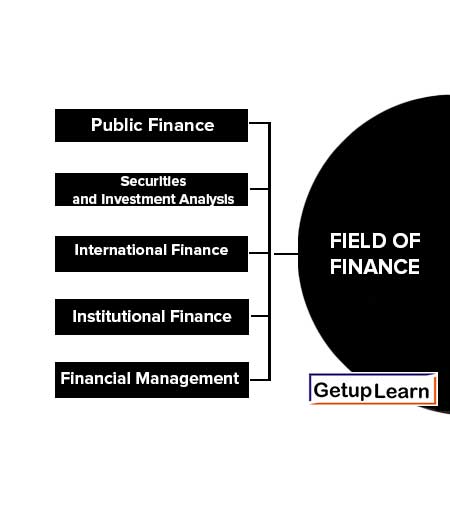The academic discipline of financial management may be viewed in terms of various specialized fields. In each field, the financial manager is dealing with the management of money and claims against money.

Distinctions arise because different organizations pursue different ‘Objectives and do not face the same basic set of problems.
Table of Contents
Field of Finance
These are the five fields of finance that Hampton recognized:
- Public Finance
- Securities and Investment Analysis
- International Finance
- Institutional Finance
- Financial Management

Public Finance
Central, State, and local self-governments handle large sums of money, which are received from many sources i.e. tax and nontax revenue. These funds are utilized on developmental and non-development expenditures in accordance with detailed policies programs and procedures.
The government has the authority to tax and otherwise raise funds but must dispense funds according to legislative and other limitations. Businesses try to make profits, whereas a government attempt to accomplish the social or economic objective. As a result of these and other differences, a specialized field of public finance has emerged to deal with governmental financial matters.
Securities and Investment Analysis
Purchases of shares, debentures, bonds, and other securities involve analysis and techniques that are specialized. An investor must study the legal and investment characteristic of each type of security, measure the degree of risk involved with each investment, and forecast probable performance in the market.
Usually, this analysis occurs without the investor having any direct control over the firm or institution represented by the form of security. The field of investment analysis deals with these matters and attempts to develop and increase the likely return from the purchase of selected securities.
International Finance
When money crosses international boundaries individuals, businesses, and governments must deal with special kinds of problems. Each country has its own national currency; thus a citizen of the United States must convert dollars into French francs before being able to purchase goods or services in Paris.
Most governments have imposed restrictions on the exchange of currencies, and these may affect business transactions. The study of flows between individuals and organizations across national borders and the development of methods of handling the flows more efficiently and properly within the scope of international finance.
Institutional Finance
A nation’s economic structure contains a number of financial institutions, such as banks, insurance companies, pension funds, and credit unions. These institutions gather money from individual savers and accumulate sufficient amounts for efficient investment.
Without these institutions, funds would not be readily available to finance business transactions, the purchases of private homes and commercial facilities, and a variety of other activities that require substantial amounts of capital. Institutional finance deals with issues of capital formation and the organizations that perform the financing function of the economy.
Financial Management
Individual business face problems dealing with the acquisition of funds to carry on their activities and with the determination of the optimum method of employing the funds. In a competitive marketplace, a business must actively manage its funds to achieve its goals.
Many tools and techniques have been developed to assist financial managers to recommend proper courses of action. These tools help the manager determine which sources offer the lowest cost of funds and which activities will provide the greatest return on invested capital.
Financial management is the field of greatest concern to the corporate financial officer and will be the major thrust of the approach we shall use in studying finance.
FAQs About the Field of Finance
What are the major fields of finance?
The following are the five major fields of finance:
1. Public Finance
2. Securities and Investment Analysis
3. International Finance
4. Institutional Finance
5. Financial Management.


